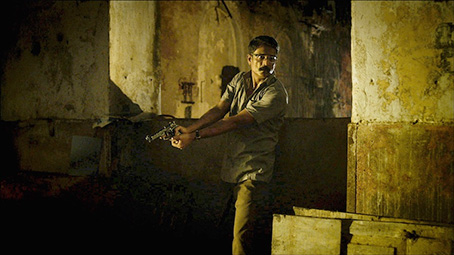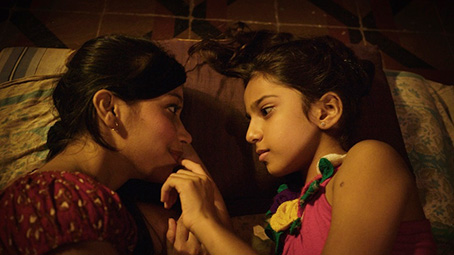|
In a rain-drenched corner of Mumbai, a man wakes and surveys his surroundings. It quickly becomes evident that he's in a provincial police station, but it takes a little longer to establish that he is not a suspect but Inspector Joshi, one of the station's resident officers. Has he been dreaming or recalling a past case? Maybe both. The opening shot showed him playing with a baby, but it is later revealed that the six-year-old daughter that this child grew into was kidnapped in front of her school ten years earlier and Joshi has had no news of her since. The loss continues to haunt him and has driven his wife to the edge of madness, locking her in a past time when she was able to boast that her daughter was the smartest girl in class. It emerges that this was not an isolated case and that girls are continuing to disappear and occasionally turn up dead. When one desperate mother pleads with Joshi and hands him a photo of her missing daughter, her desperation strikes a nerve. But the investigation is going nowhere, save for a possible link to a sleazy nightclub named Paradise that Joshi may or may not have at one time visited.

The fate of the missing girls is revealed to us when the film moves away from Joshi to focus on one of them, Komal, who is now an unwilling participant in India's sex trade. Confined to a single room that she shares with similarly unfortunate girls, she is let out only when the time comes for her to ply her trade. The girls are overseen by a middle-aged woman of stern constitution named Radhabai, who that evening instructs Komal to watch over their newest arrival, the frightened young Naina. A bond quickly develops between the two girls, and when Komal finds Radhabai preparing Naina for what we can only presume is her introduction to the world of forced prostitution, her despair boils angrily over as memories of her own past suffering tear a hole through the symbolic purity that Naina represents. As the unaware Naina is led away by Radhabai, we are given cause to shudder at what lies ahead for her by Komal's desperate scream to Radhabai, "Don't send her there!"
As the two stories unfold in tandem, director Partho Sen-Gupta avoids cross-cutting between them and instead stays with either Joshi or Komal for whole segments of the film and presents events exclusively from the viewpoint of the character on whom that particular section is focussed. These two strands almost collide early on when a police raid brings Joshi into the very room in which the girls are being held, but by the time the detective arrives the girls have been shepherded into the attic above and ordered to keep silent, and Radhabai is deflecting police attention with a show of defiant bluster. As we are in Komal's world at this point in the story, the entire sequence is shown from her point of view, watched through a small gap in the ceiling that divides the two parties.

When it come to Joshi, the subjective manner in which the two story strands are presented makes it increasingly hard to be sure where the barriers between reality, memory, nightmare and fantasy actually sit. The film does not so much observe Joshi as climb inside his head, forcing us to experience the world not as it is but as he is perceiving it, a reality peppered with hallucinatory shadows and dark, despair-induced daydreams. This really starts to register during Joshi's second visit to the Paradise club, which is effectively a replay of the previous one – which I took at face value – but with a few key details changed, and leads to a third that may be nothing but anger-fuelled wish-fulfilment and a climactic rescue attempt that, although tensely handled, may well be taking place entirely in the increasingly unstable Joshi's head.
Sunrise is an almost entirely character focussed work in which story takes a back seat to character, mood and subtextual suggestion. Set over the course of a single night in a torrent of constant rainfall, Sen-Gupta's immersive direction is impressively served by Jean-Marc Ferriere's darkly atmospheric cinematography and a string of excellent performances, from Gulnaaz Ansari's initial dead-behind-the-eyes stare and later emotional torment as Komal, to the anguish and repressed despair displayed by Adil Hussain (recognisable to international audiences for his role as the father in The Life of Pi) as the tortured Joshi. A gripping, doom-soaked and noir-tinged psychological thriller, Sunrise sidesteps the police procedural opportunities offered up by its setup to explore the very real issue of child abduction and exploitation (a closing caption reveals that over 100,000 children go missing each year in India) from the perspective of those it swallows up and destroys in its wake.
Sunrise screened at the 2015 BFI London Film Festival on Tuesday 13 October 2015 21:00 at the Hackney Picturehouse, Screen 1 and Friday 16 October 2015 15:45 at ICA Cinema, Screen 1
|